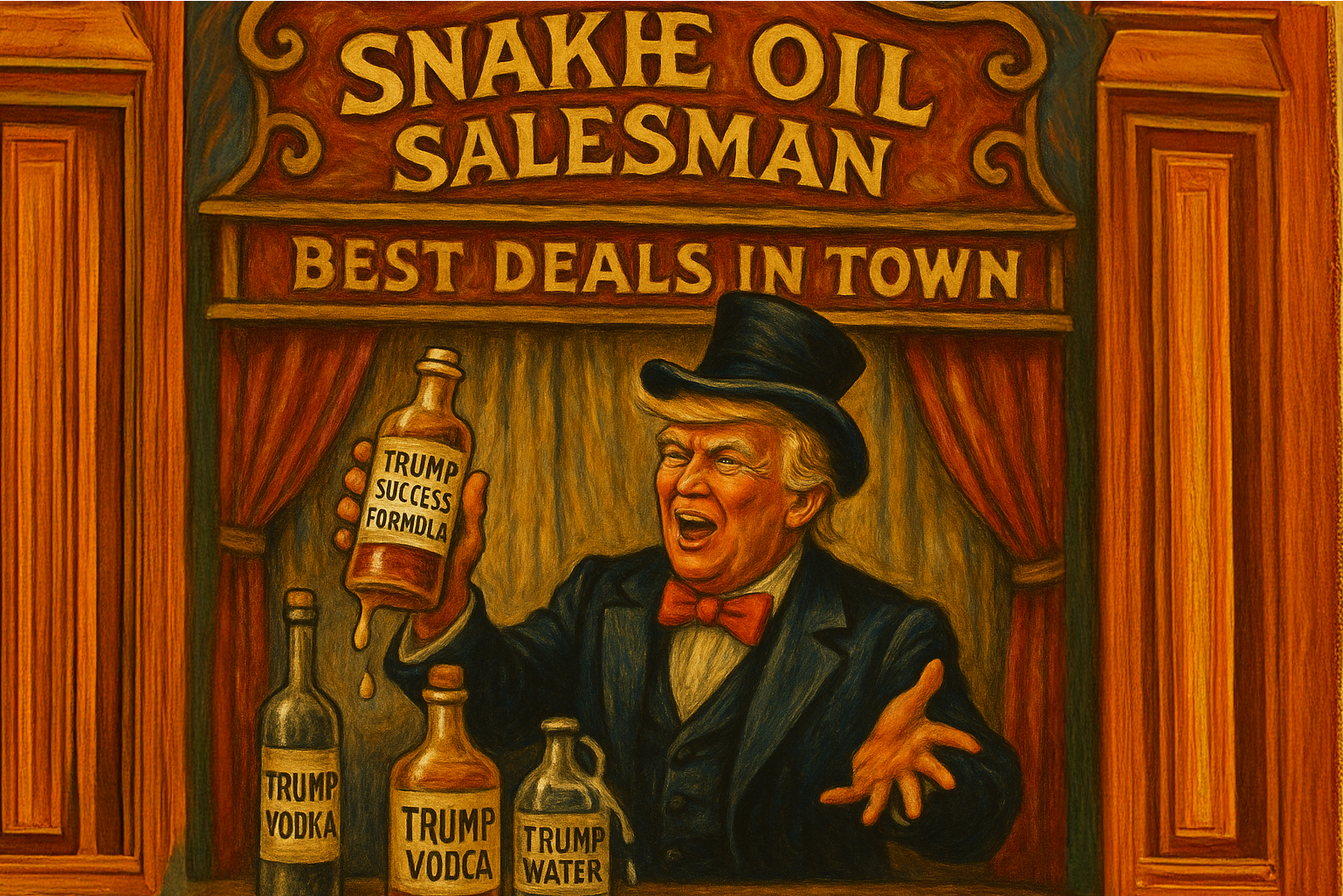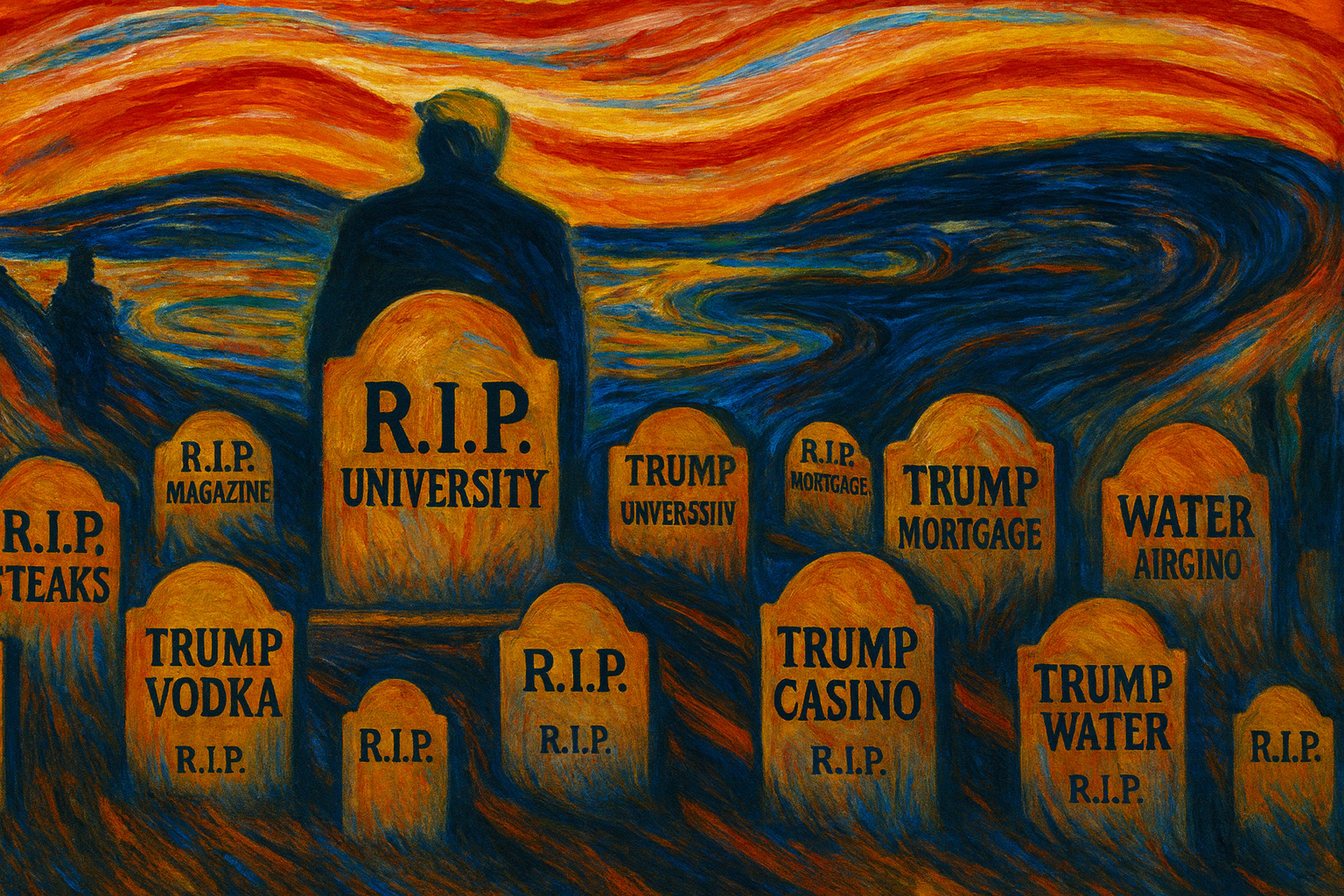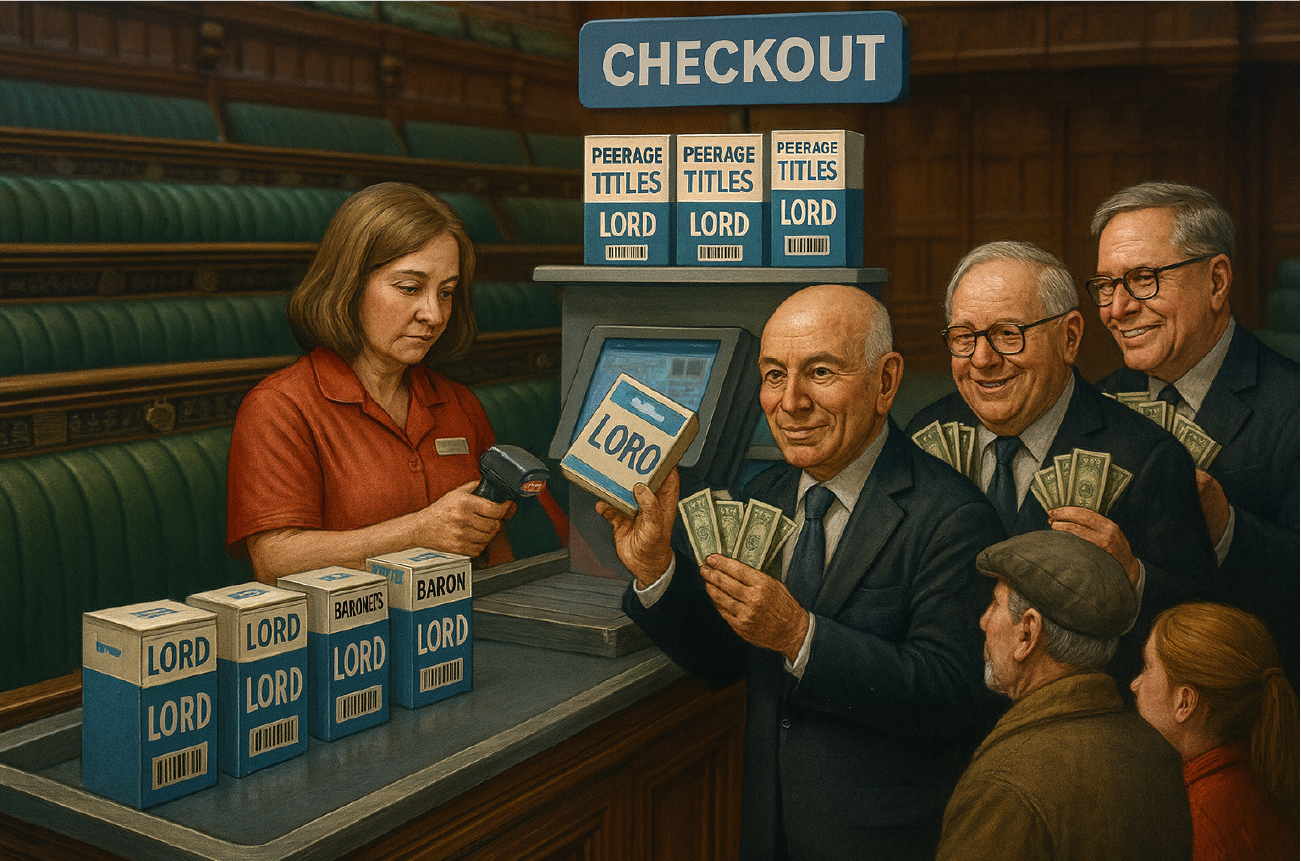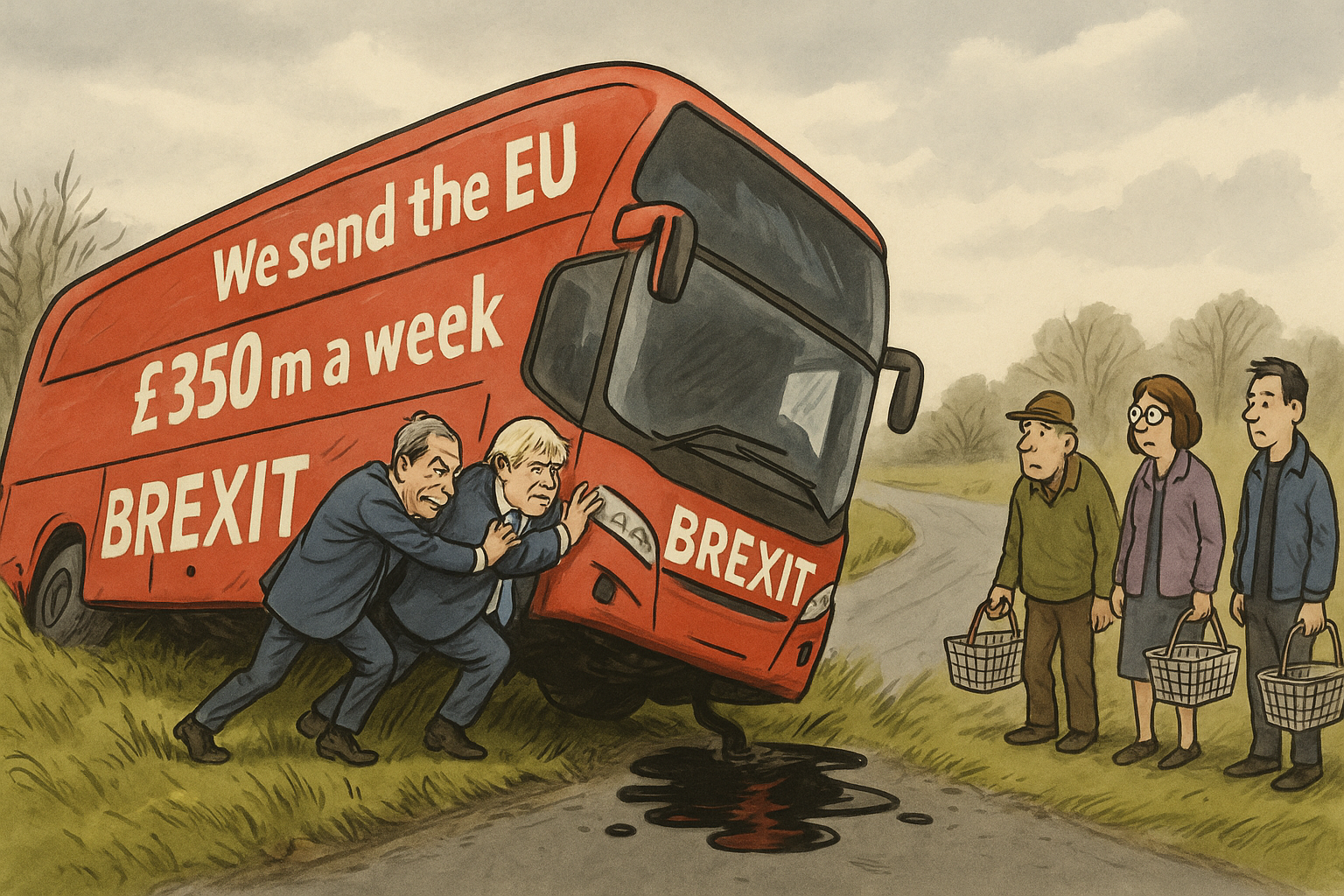Stay in the loop!
Summary
You’ve heard the myth: Donald Trump, self-made billionaire, genius deal maker, titan of industry. Now here’s the truth. Six bankruptcies, a graveyard of failed businesses (including vodka, steaks, a fake university, and a travel site nobody used), hundreds of lawsuits, and a financial performance that would’ve been better if he’d just parked his daddy’s money in a basic stock fund and gone golfing forever. This article rips apart the illusion ofTrump the businessman, comparing him to real moguls who actually built empires, showing how he squandered a massive inheritance, and exposing the shady, often fraudulent tactics he used along the way. Spoiler, the man who says he’s a genius looks more like a clueless mascot for failure in a cheap suit. Strap in. This one’s gonna leave a mark.
Boastful Claims vs. Brutal Reality
The current president often touts his business acumen, but his track record tells a different story.
Donald Trump has long styled himself as a master businessman, bragging about his deal making prowess and self-proclaimed billions. On the campaign trail and in media interviews, he claimed to have built a great company from almost nothing, infamously citing “a very small loan” of $1 million from his father as his start The Washington Post. The reality behind Trump’s business record, however, starkly contradicts the myth. From a series of bankruptcies and failed ventures to evidence that his fortune would be larger had he simply invested his inheritance in stocks, Trump’s career showcases how not to run a business empire. This report takes a hard, fact-based look at Trump’s many business failures and controversies, comparing them to the successes of others in similar industries. The findings – supported by court documents, investor filings, and reputable news investigations reveal a litany of missteps and mismanagement that expose the hollowness of Trump’s business reputation.
Inherited Wealth and Missed Opportunities
Trump often paints himself as a self-made billionaire, but extensive investigations show he was propped up by a vast inheritance. Donald’s father, Fred Trump, provided him far more than the oft-mentioned $1 million. In fact, a Wall StreetJournal review of casino records found Fred Trump lent Donald $14million (equivalent to about $31 million in today’s dollars) early in his career politico.com. And that was just the beginning. A bombshell New York Times investigation in 2018 revealedDonald Trump “received at least $413 million from his father over the decades,” much of it through tax schemes and outright fraud apnews.com. In short, Trump had a massive head start in life. Hardly the scrappy entrepreneur he portrays himself to be.
What ifTrump had simply invested that family fortune in the stock market? Analysts have crunched the numbers, and the results are telling. Reuters reported that had Trump put the approximately $40 million he inherited in 1974 into a basic S&P 500 index fund, it “would be $3 billion today” (as of 2015) reuters.com. Even taking a later benchmark, Forbes estimated Trump’s net worth at $200 million in 1982, if he’d passively invested that in the market, he’d have around $8 billion by 2015. By contrast, Trump’s actual wealth today is widely believed to be far less, roughly in the $2.5–4 billion range (he claims $10 billion, an assertion not backed by any released records). In other words, decades of Trump’s “deal-making”barely kept pace with, or even lagged behind, a plain index fund. As Vox summarised, after all his noisy ventures and self-touted prowess, Trump’s investment record at best roughly matches, and at worst underperforms, the stock market, suggesting his success is almost entirely the result of having inherited wealth, not business genius vox.com.
Indeed, Trump’s own actions may have cost him money relative to a hands-off approach. Financial journalists note that an ordinary investor “with a Vanguard401(k)” could have matched or beaten Trump’s results. This undercuts Trump’s core claim that his negotiating skills and business “brains” created extraordinary value. The numbers show that if anything, Trump’s performance was mediocre, and might well have been surpassed by simply “sipping cocktails on the beach” while letting an index fund do the work.

The Bankruptcy King: Casinos and Hotels Collapse
If Trump’s inherited wealth set a high floor, his mismanagement nearly broke the entire Trump empire in the early 1990s. Nowhere is Trump’s poor business judgment clearer than in his string of bankruptcies. Despite constantly touting“winning” deals, Trump presided over a corporate collapse in Atlantic City’s casino market. Trump’s companies filed for Chapter 11 bankruptcy protection six times, by the respectable media's count and Trump himself, he has admitted to at least four, quibbling only by grouping some together washingtonpost.com. According to a Washington Post fact-check, the record includes:
- Taj Mahal casino – opened in 1990 as Trump’s over leveraged “eighth wonder of the world,” it defaulted on interest payments within six months as Trump’s finances went into a “tailspin,” leading to bankruptcy in 1991 The Guardian.
- Trump's Castle and Trump Plaza casinos – unable to service their heavy debts, both filed bankruptcy in 1992 washingtonpost.com.
- The Plaza Hotel (New York City) – another Trump property that went bankrupt in 1992 under a crushing debt load The New Yorker.
- Trump Hotels & Casino Resorts (THCR) – Trump’s publicly traded casino company founded in 1995, which filed bankruptcy in 2004 after accumulating about $1.8 billion in debt washingtonpost.com.
- Trump Entertainment Resorts – the successor entity to THCR, which went bankrupt in 2009 amid the Great Recession washingtonpost.com.
Trump attempted to spin these failures as savvy use of the laws. But the sheer number of bankruptcies is extraordinary. As the Los Angeles Times dryly noted in a recent rundown of Trump’s disastrous deals, “a number of companies associated with President Trump have filed for bankruptcy,” and even Trump’s own SPAC investor filings warn there is no assurance his newest company won’t also go under latimes.com. Trump has at times tried to count the first three casino bankruptcies as “just one” event to downplay the total washingtonpost.com, but facts are facts – six bankruptcies is a record of failure, not success.
These weren’t harmless resets, either. Trump’s mismanagement had severe consequences. Perhaps the starkest illustration is what happened to Trump Plaza Casino in Atlantic City. Opened in 1984, it was once a glamorous hotspot for celebrities. But after waves of bankruptcies and underinvestment, by the time it closed in 2014 it was the worst-performing casino in Atlantic City, generating less revenue in eight and a half months than rival Borgata managed in two weeks theguardian.com. The property deteriorated into such disrepair that chunks of its facade were falling off, prompting Atlantic City’s mayor to label it an “eyesore.” In February 2021, the derelict Trump Plaza was finally demolished in a controlled implosion, reduced to rubble before a cheering crowd of onlookers. As one observer put it, the spectacle of Trump’s former crown jewel casino being blown up served as a fitting metaphor for the collapse of his business ventures.
Trump’s failures in Atlantic City were so extensive that even banks lost faith in his acumen. In the early 1990s, Trump personally fell into nearly $900million in debt due to his over leveraged casino and hotel deals washingtonpost.com. At one low point, he reportedly quipped that a homeless man on the street was “worth $900 million more” than he. Major lenders considered forcing him into personal bankruptcy, which would have nearly wiped him out – but chose to avoid a protracted legal battle. Instead, they forgave hundreds of millions in Trump’s debts to salvage some value out of his assets, effectively bailing him out and allowing him to cling to a sliver of his empire. Trump escaped total ruin only because banks calculated that cutting deals was cheaper than liquidating his assets in court. In essence, Trump’s creditors “made a series of deals that left him wealthy” even as they wrote off huge losses, a luxury not afforded to most failed businessmen, and hardly a testament to Trump’s skill. As the Washington Post later observed, Trump’s near-collapse and rescue underscored how his bravado outstripped his business ability, proving him more lucky than smart.
A Catalogue of Failed Ventures
Beyond casinos and hotels, Trump’s business record is littered with failed ventures across diverse industries – from airlines to education to consumer products. Far from repeating his father’s focused success in real estate,Donald Trump spent decades stamping his name on one dubious project after another, many ending in embarrassment. Consider this partial list ofTrump ventures that flopped, as documented in official filings and news reports.
- Trump Airlines (Trump Shuttle) – In 1989, Trump bought an East Coast air shuttle service, plastered his name on the planes, and promised luxury service. Within a year, the airline was defaulting on its loans; by 1992, Trump Shuttle had ceased to exist after lenders took it over latimes.com. Trump walked away as the airline failed, having never turned a profit.
- Trump University – Launched in 2005 as a for-profit real estate seminar program (despite the misleading “university” title), it folded by 2011 amid fraud investigations. Students accused the program of being a scam, high-pressure sales for expensive mentorships that delivered none of the promised expertise. New York’s Attorney General called Trump University “fraudulent” and “a sham” that swindled thousands of people abcnews.go.com. After repeatedly insisting he would never settle, Trump in 2016 agreed to pay $25 million in restitution to defrauded students to resolve multiple lawsuits. The fact that a sitting president-elect at the time settled a fraud case against his “university” underscores how egregious this venture was.
- Trump Vodka – Introduced in 2005 with Trump’s typical hyperbole (“Success Distilled” was the tagline), the liquor failed to gain market share. Sales fizzled, and by 2011 Trump Vodka was discontinued latimes.com. (It turns out slapping “Trump” on a bottle didn’t guarantee people would drink it.)
- Trump Mortgage – Trump launched a mortgage brokerage in 2006 at the height of the housing bubble, even bragging that he “knew” the real estate market and it was a great time to get in. The timing was disastrous; the housing market collapsed. By 2007, barely a year later. Trump Mortgage had closed its doors after failing to make any impact (aside from not paying some employees; more on that later).
- GoTrump.com – In 2006 Trump also tried to enter the online travel business, creating a sort of Trump-branded Expedia. The site lasted only months. By 2007, GoTrump.com was shut down as consumers showed little interest in booking travel through Trump’s portal.
- Trump Steaks – Perhaps the most lampooned venture, Trump in 2007 hawked premium steaks (and other meats) under his name, initially via outlets like Sharper Image. The venture was a dud. Trump Steaks ceased sales after just two months due to weak demand. Sharper Image’s CEO later said “we literally sold almost no steaks” and that carrying the product “almost put us out of business” – a rare case where another company nearly went bust from a Trump failure. latimes.com
- Trump Magazine – Trump lent his name to a glossy magazine about luxury living (originally Trump World magazine). It folded in 2009 during the recession.
- Trump, The Game – A 1989 Milton Bradley board game hyped by Trump (“It’s not whether you win or lose, but whether you win!”) sold poorly and was discontinued shortly after release. A 2004 attempt to revive it also fizzled.
This list could go on. From Trump Ice (bottled water) to Trump Fragrances, many Trump branded consumer goods have come and gone quietly. Even ventures that weren’t outright scams often revealed Trump’s poor business planning and inability to deliver. For example, when the Trump International Hotel & Tower in Baja Mexico failed in 2009, hundreds of depositors lost money on a never built development (Trump’s organisation argued he only licensed his name and wasn’t the developer, but buyers felt misled). Time and again, Trump jumped into a business he didn’t fully understand, made big promises under the gaudy gold plated Trump brand, and then bowed out when reality undercut the hype.
In fact,Trump’s propensity to lend his name to dubious enterprises became so notorious that it warranted disclosure in financial filings. The SEC filing for the Trump Media & Technology Group’s SPAC merger in 2022 included a section titled “Risks Related to our Chairman President Donald J. Trump.” It matter-of-factly catalogued Trump’s history of business failures, listing the bankrupt casinos and the flopped licensed ventures (Trump Shuttle, Trump University,Trump Vodka, Trump Mortgage, GoTrump.com, Trump Steaks…) as cautionary tales for investors. It even noted Trump’s entanglement in various lawsuits and investigations that could distract or damage the business. When a company’s own investor prospectus warns that its chairman’s reputation includes multiple bankruptcies and failed brands, it’s a pretty strong indictment of that individual’s business track record.
Controversies and Questionable Business Practices
Donald Trump’s business empire wasn’t just a string of flops — it was riddled with grift, lawsuits, and dodgy ethics. The man who brands himself a “champion of the working class” has a long, well-documented history of stiffing contractors, swindling customers, and even abusing charity laws.
A 2016 USA Today investigation found over 60 lawsuits from everyday workers—plumbers, waiters, real estate agents, even lawyers—who claimed Trump simply refused to pay them for work done. More than 200 liens were filed for unpaid wages, and Trump properties racked up at least 24 labour law violations. His go-to excuse? The work wasn’t good enough—an all-too-convenient tactic for bullying small businesses into settling for scraps. As Fortune magazine summed up, Trump routinely stiffed people, betting they couldn’t afford to fight a billionaire in court.
Then there's the Donald J. Trump Foundation, which was ordered shut by New York’s Attorney General in 2018 after being exposed as a slush fund for Trump’s personal and political use. It paid for lawsuits, campaign donations, and even a $10,000 portrait of himself. A judge ordered Trump to pay $2 million in damages, and he was banned from running a New York charity for 10 years — a rare sanction for a former president.
Let’s not forget Trump University — a glorified sales scam masquerading as an education program. Despite promising “hand-picked” instructors and wealth-building secrets, it delivered overpriced fluff and left students drowning in debt. Internal documents showed aggressive tactics urging vulnerable people to max out credit cards. In 2016, Trump paid $25 million to settle fraud lawsuits, without admitting wrongdoing. As the New York Attorney General put it, it was a “stunning reversal” from a man who insisted he would never settle.
And the financial shadiness doesn’t stop there. Trump’s businesses have been accused of inflating asset values to secure loans while downplaying them to avoid taxes — a balancing act only a seasoned con artist could pull off. The New York Times revealed that Trump paid no federal income tax in 10 out of 15 years, exploiting massive claimed business losses. In 2022, the Trump Organization was convicted of tax fraud, though Trump himself wasn’t charged.
Conclusion: The “Idiot” in the Boardroom
Donald Trump’s actual record in business is a far cry from the genius deal-maker image he promotes. The facts, backed by court records, regulatory filings, and Trump’s own admissions present a harsh verdict.
- He inherited enormous wealth and advantages, yet underperformed the market and peers who had far less. If he simply did nothing but invest in index funds, he likely would be richer today reuters.com
- He drove multiple companies into bankruptcy, betraying an inability to manage debt and strategy. No major U.S. real estate figure of his era racked up as many Chapter 11 filings as Trump did washingtonpost.com
- He showed a pattern of over-hyping and under-delivering on business ventures. Launching product lines and companies with great fanfare only to see them crash in flames within a few years (or months)latimes.com.
- He frequently relied on legal and financial rescues (from forgiving bankers to settlement agreements) to escape consequences that would have sunk a less famous businessmanwashingtonpost.com
- He engaged in unethical practices, from defrauding students and misusing charity funds to gouging contractors, which tarnish any claim to upright business leadership nbcbayarea.com.
In the broader context, many entrepreneurs and moguls who started around the same time vastly outperformed Trump. Casino magnates like Steve Wynn and Sheldon Adelson built gaming empires without serial bankruptcies, and turned initial stakes smaller than Trump’s into fortunes larger than his. Tech billionaires, retail tycoons, countless peers surpassed Trump’s wealth through genuine innovation or management skill. Trump instead largely tread water, buoyed by his inherited assets and his talent for self-promotion. His biggest success was arguably The Apprentice, a reality TV show that burnished his brand while masking his real-life business shortcomings. It is quite telling that Trump made more money in the 2000s licensing his name (and playing a business mogul on TV) than from actual business operations.
To put it bluntly, Donald Trump has proven to be not a business savant but a business cautionary tale. His career is a study in how not to run an enterprise, over-leverage your assets, ignore expert advice, alienate partners, refuse to pay bills, and prioritise showy vanity projects over sustainable strategy. Though Trump would never admit it, the numbers and outcomes make him look, in the words of this article’s headline, “like a true idiot” in the business realm. That may sound harsh, but consider the evidence presented, who but a fool would squander the advantages Trump had?
In the end,Trump’s business record can be summed up as a series of billion-dollar blunders tempered by lucky bailouts and branding theatrics. The emperor’s proud claim of financial genius has no clothes, or perhaps more fittingly, it’s wearing a cheap Trump branded suit sold at a steep discount. The myth of Donald Trump, the great businessman, collapses under the weight of reality, just as his casino empire literally collapsed into dust on the Atlantic City boardwalk theguardian.com. And that is the brutal, factual truth.








-01.png)

